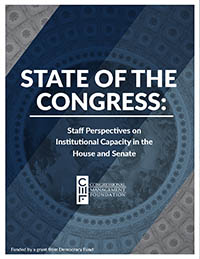Democracy is in a period of crisis. Both in Congress and across the world, people are questioning whether democratic institutions are equipped to meet today's challenges. This skepticism is shown in the record-low numbers of Americans expressing confidence in Congress' ability to do its job.
The good thing is that there are many smart, dedicated people inside and outside of Congress that are thinking of ways to make Congress more resilient: better able to thrive in the face of pressures generated by the recent revolutions in technology and social upheavals. So far, however, these thinkers have been isolated in their respective fields. Nobody is talking to one another and nobody is seeing the bigger picture of how each of Congress' shortcomings affects the others and contributes to the institution's current dysfunction. More holistic thinking by everyone involved will be required to truly understand the state of Congress and bring about the necessary changes to make the institution more resilient.
Through a grant from Democracy Fund, the Congressional Management Foundation, in collaboration with Voice of the People (VOP), the Edward M. Kennedy Institute for the United States Senate (EMKI), and Lorelei Kelly, is changing this by forming a Resilient Democracy coalition. This concept postulates that in order for government to successfully discharge its responsibilities in the face of complex and rapidly-evolving events, the Congress must have the infrastructure, capacity, time, and knowledge necessary to perform its role.
CMF strongly supports the concept, and feels it has the possibility to unite and galvanize the many schools of thought about how to "fix" Congress in a way that few other concepts or issues can. A key element of the project involves CMF, VOP, and EMKI regularly convening academics, practitioners, technologists and the public to address the challenges and opportunities facing congressional operations. We are facilitating deliberation among the thought leaders to produce a unified, cohesive vision about the state of Congress. With this vision in place, we can use our combined efforts can make both Congress, and American democracy, more resilient.
Featured Research
STATE OF THE CONGRESS: STAFF PERSPECTIVES ON INSTITUTIONAL CAPACITY IN THE HOUSE AND SENATE
 Americans widely believe that Congress is not working because it does not want to work. Conventional wisdom holds that the blame for any democratic dysfunction lies primarily with current occupants of Capitol Hill. In its latest report, "State of the Congress: Staff Perspectives on Institutional Capacity in the House and Senate," CMF offers an alternative perspective. Congress may not be working well because it does not currently have the capacity to work well.
Americans widely believe that Congress is not working because it does not want to work. Conventional wisdom holds that the blame for any democratic dysfunction lies primarily with current occupants of Capitol Hill. In its latest report, "State of the Congress: Staff Perspectives on Institutional Capacity in the House and Senate," CMF offers an alternative perspective. Congress may not be working well because it does not currently have the capacity to work well.
"State of the Congress" focuses primarily on the resource and operational challenges congressional staff have been facing over the past few decades and provides a context for them. It offers new insight into the roots of current congressional dysfunction and paths toward pragmatic reforms to strengthen Congress and American democracy. Read More
Related Project
Congress 3.0

CMF was awarded a two-year grant from Democracy Fund to leverage existing CMF knowledge and conduct new research to improve the operational effectiveness of individual offices, enhance their citizen engagement practices, and benchmark Congress-wide attitudes and activities. Through the Congress 3.0 project, CMF and academics from four major U.S. universities conducted innovative experiments for engaging constituents with a cohort of 17 House and Senate offices to assess whether the enhanced engagements resulted in greater understanding and trust in Congress. Read More


